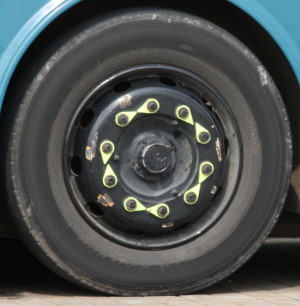tinap
Well-Known Member
I had a wheel completely fly off my landrover  I had been bombing down the motorway & the car started to feel odd so I got off just before it crashed to the floor & every alarm known to man started going off in the car!! i had to let it crash into the kerb to stop as the brakes wouldn't work.
I had been bombing down the motorway & the car started to feel odd so I got off just before it crashed to the floor & every alarm known to man started going off in the car!! i had to let it crash into the kerb to stop as the brakes wouldn't work.
A bloke pulled up behind me & said he'd seen bolts flying off on the motorway!! I found 2, the other 3 were lost & 2 of the pin things were sheared off. The wheel was stuck underneath the car & the front end was all bashed in. Turned out my Dumbarse mechanic hadn't tightened the wheel when it had been to him for some work the week before. It still scares me now to think what could have happened if I'd stayed on the motorway - I had been late & hate to admit it, but was very much speeding
A bloke pulled up behind me & said he'd seen bolts flying off on the motorway!! I found 2, the other 3 were lost & 2 of the pin things were sheared off. The wheel was stuck underneath the car & the front end was all bashed in. Turned out my Dumbarse mechanic hadn't tightened the wheel when it had been to him for some work the week before. It still scares me now to think what could have happened if I'd stayed on the motorway - I had been late & hate to admit it, but was very much speeding

